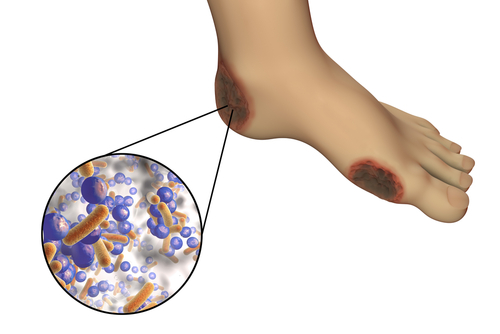Probiotics accelerate wound healing in patients with diabetic foot ulcer
M3 Global Newsdesk Jan 24, 2018
Patients with diabetic foot ulcer (DFU) who were given probiotic supplements for 12 weeks had faster wound healing and improved glycemic control compared with similar patients on placebo, according to researchers who recently published their results in Diabetes/Metabolism Research and Reviews.

“Due to the increasing global antimicrobial drug resistance issues, the idea of probiotic consumption is interesting and pertinent because probiotics have the ability to strengthen the immune system, have anti-inflammatory effects, and therefore, could increase the wound healing process,” wrote lead co-author Zatollah Asemi, PhD, assistant professor of nutrition, Kashan University of Medical Sciences, Kashan, Iran, and colleagues.To explore this possibility, the researchers recruited 60 subjects (40-85 years old) with grade 3 DFU with cellulitis. Patients were randomly assigned to two groups (30 subjects each) to receive either a daily placebo or a daily probiotic capsule containing Lactobacillus acidophilus, Lactobacillus casei, Lactobacillus fermentum, andBifidobacterium bifidum.
Bacteria with benefits
After 12 weeks, patients given probiotic supplements had significant reductions in average ulcer length (-1.3 cm vs -0.8 cm, P=0.01), width (-1.1 cm vs -0.7 cm, P=0.02) and depth (-0.5 cm vs -0.3 cm, P=0.02) compared with patients on placebo.Patients on probiotics also had significant reductions in average fasting plasma glucose (-29.6 mg/dL vs -5.8 mg/dL, P=0.01), serum insulin concentrations (-4.3 μIU/mL vs +0.4 μIU/mL, P=0.03), and HbA1c (-0.6% vs -0.2%, P=0.003), and a significant rise in the quantitative insulin sensitivity check index (+0.01 vs -0.01, P=0.003) compared with those on placebo.
Probiotic supplementation also resulted in significant decreases in average serum total cholesterol (-4.8 mg/dL vs +7.0 mg/dL, P=0.04), high sensitivity C-reactive protein (-9.0 mg/L vs -1.7 mg/L, P=0.02), plasma malondialdehyde (-0.8 μmol/L vs -0.2 μmol/L, P=0.001), and significant increases in plasma nitric oxide (+6.2 μmol/L vs +0.8 μmol/L, P=0.01) and total antioxidant capacity concentrations (+179.3 mmol/L vs -85.1 mmol/L, P< 0.001).
“To our knowledge, this study is the first report of probiotic supplementation on wound healing, glucose metabolism, lipid profiles, and biomarkers of inflammation and oxidative stress among subjects with DFU,” Dr. Asemi and colleagues wrote.“Further studies are needed to clarify the mechanisms and address the time for healing, including probiotics’ effects on the stromal cell-derived factor-1 and circulating endothelial progenitor cells,” they noted.
This story is part of our Global Content Initiative, where we will feature selected stories from our Global network which we believe would be most useful and informative to our doctor members.
-
Exclusive Write-ups & Webinars by KOLs
-
Daily Quiz by specialty
-
Paid Market Research Surveys
-
Case discussions, News & Journals' summaries